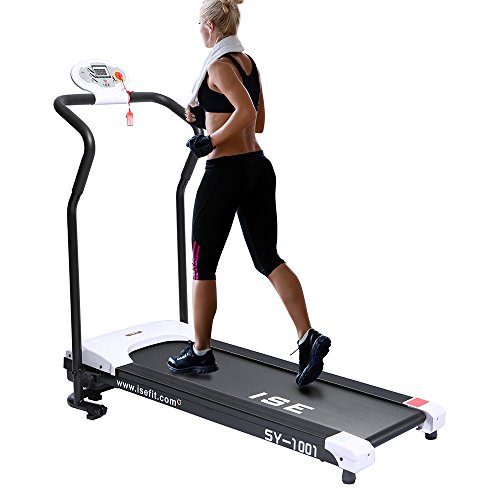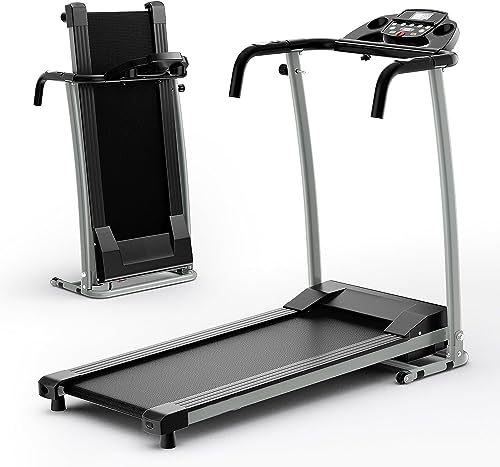How Do I Explain Treadmill Electric Motor To A Five-Year-Old
페이지 정보
작성자Anna Ponce 댓글댓글 0건 조회조회 52회 작성일 24-09-26 01:54본문
 Understanding the Treadmill electric walking pad treadmill Motor
Understanding the Treadmill electric walking pad treadmill MotorThe motor is the most crucial element of any treadmill. It turns energy from your outlet into movement that causes the belt to move.
When shopping, knowing the motor specifications is crucial to find the best compact electric treadmill for sale treadmill [kingranks.com] treadmill for your fitness goals. This article focuses on key factors such as peak duty and continuous duty, power rating system warranties, durability, warranty and maintenance tips.
How does a motor function
The motor is the heart of any treadmill, allowing it to move the belt to allow you to run, walk or jog. It's also the main component of the treadmill and plays a big role in its performance as well as longevity. Understanding how motors function is crucial to making an informed decision.
There are two main types of electricity: DC and AC. Each has its own advantages and disadvantages, but they both function in the same manner. DC motors can be used in many applications like robotics, electric vehicles. They are extremely efficient durable, long-lasting, and easy to control. AC motors, on the contrary, are used in treadmills as well as other fitness equipment. DC motors are more affordable but AC motors have superior performance and longer lifespan.
Treadmills are available in different sizes and specifications, based on the needs of every user. The factors that determine this include the size of the motor, the power output, the noise level, and the cost. There are manual treadmills that do not have motors and are powered by the user.
It can be difficult to determine what size of motor means. The size of a motor is determined by how much power it can produce at its maximum. This figure is often referred to by the term power called horsepower (HP), that represents the amount of energy it can produce.
You can regulate the speed of a treadmill using different methods, including a variable resistance or a pulse-width modulation controller. The controller that is the latter alters the amount of current that is flowing to the motor, which in turn alters the speed of the motor. These controls are found on most treadmills. However, they are less common in home gyms.
Before you make a choice, it is important to understand the way a treadmill motor functions. If you know what each component does, you will avoid spending your money on a low-quality model.
Motor size
The motor size is often a hazy aspect of the specifications when you are shopping for a treadmill. While bigger is better but it's equally important to understand what the horsepower specification actually refers to for your fitness needs.
The most common misconception is that the highest horsepower rating (PHP) on treadmills is the same as the quality of the treadmill. This is not the case because a treadmill's maximum power is only sustained for short intervals of time before it wears out the motor. A more accurate measurement is continuous horsepower (CHP) which measures the amount of the power a treadmill's engine can generate for a long time without losing its effectiveness.
The motor's RPM is another important feature. This is the amount of revolutions that a motor can achieve per minute. This is a measure of the motor's power and ability to drive the belt smoothly. Low RPM ratings may result in disruptive lags in the belt speed, which can impact your treadmill experience.
There are two main kinds of treadmill motors: DC and AC. AC motors are typically used in gyms for commercial use are best suited to high-use environments. DC motors tend to be used in fitness centers and home equipment. DC motors are powered by direct current electricity, which creates an electric treadmill sale field that interacts with permanent magnets within the motor to produce motion.
AC motors are the ideal option if you are looking for an excellent treadmill motor. AC motors are more robust and can stand up to the wear and tear of repeated use throughout the day. They're also less prone to overheating than DC motors. If you're on a tight budget, you can find quality treadmills with motors that are still affordable and can meet your requirements.
Motor warranty
Make sure to check the warranty of the motor when you're shopping for the treadmill. A good treadmill motor should have a warranty that lasts for 10 years or more. A longer warranty period is a sign of a higher-quality motor that's less likely break down over time. You should also be aware that different treadmill manufacturers have different warranties on their motors, and it's important to research the companies before you buy.
The motor is the engine that runs the treadmill belt that keeps you running or walking. A treadmill with a better motor will last longer however all treadmills require regular maintenance and cleaning to ensure that it is operating properly. The most frequently performed maintenance tasks are lubrication and vacuuming. Using a surge protector on your treadmill is also recommended to reduce the risk of electrical shock.
A good treadmill warranty can save you from costly repairs in the future. The majority of treadmills come with standard warranty, but you can also purchase an extended or lifetime warranty to give you assurance. These warranties typically include the motor, components, and labor but exclude shipping, taxes, and installation fees.
When you're looking to purchase a new treadmill, it is important to determine if the motor has a continuous or peak duty rating. Continuous-duty motors run at a constant speed, without overheating. This type of motor is generally preferred for use at home as it is quieter and uses less energy than a peak-duty treadmill. The size of a motor will determine if it's designed for continuous duty. The smaller the motor is larger, the more it's designed for continuous duty.
A treadmill motor that is rated for maximum-duty operation can be running at its peak speed for up to 15 minutes prior to overheating. It's like a sprinter that runs at their peak performance for a short period of time before slowing down. Multimeters are used to determine the treadmill's maximum duty rating. A reading of zero indicates a shorted motor while high readings indicate an open motor.
Maintenance of the motor
Like any other product, the integrity of a treadmill motor will eventually deteriorate with time. However, a regular maintenance schedule and paying attention to warning signs can extend the life of your treadmill. This includes overheating, weird noises, burning smells, malfunctioning speed and incline controls and sparks. These warnings should always be considered seriously and taken action on immediately.
Treadmill motor service might appear daunting at first, but it's actually quite easy. Take off the motor cover and unplug the treadmill. You can then utilize a multimeter to determine if there are electrical issues. You must also be able to remove any dust, hair or other debris that has been accumulating inside the motor. This will help ensure that the motor is running efficiently and won't suffer from premature deterioration.
You can repair your treadmill once you have identified the issue. If you are not sure about the repairs, find an expert in treadmill repair locally. Local service providers can provide quick and efficient service that will cut down the time you spend without your treadmill. They'll also be more knowledgeable of the specific issues that are common to your area and will be able to provide specialized solutions.
 You may need to replace your motor in the event that your treadmill is not getting the power needed to work effectively. This can be accomplished by ordering a replacement motor and installing it. Be sure to follow the manufacturer's guidelines and consult your owner's manual to find out how to troubleshoot your treadmill. Remember to unplug your treadmill when it's not in use and think about purchasing surge protectors to shield yourself from power surges. If you don't utilize your treadmill as frequently as you would like consider install a belt clip. This will stop the belt from stretching. This will prevent the motor from prematurely wearing out by ensuring that the belt is not too loose or tight. It is also important to make sure to lubricate the deck on a regular basis to ensure it's in good shape. In the end, it's recommended to invest in an additional motor in the event that the first one fails.
You may need to replace your motor in the event that your treadmill is not getting the power needed to work effectively. This can be accomplished by ordering a replacement motor and installing it. Be sure to follow the manufacturer's guidelines and consult your owner's manual to find out how to troubleshoot your treadmill. Remember to unplug your treadmill when it's not in use and think about purchasing surge protectors to shield yourself from power surges. If you don't utilize your treadmill as frequently as you would like consider install a belt clip. This will stop the belt from stretching. This will prevent the motor from prematurely wearing out by ensuring that the belt is not too loose or tight. It is also important to make sure to lubricate the deck on a regular basis to ensure it's in good shape. In the end, it's recommended to invest in an additional motor in the event that the first one fails.댓글목록
등록된 댓글이 없습니다.

